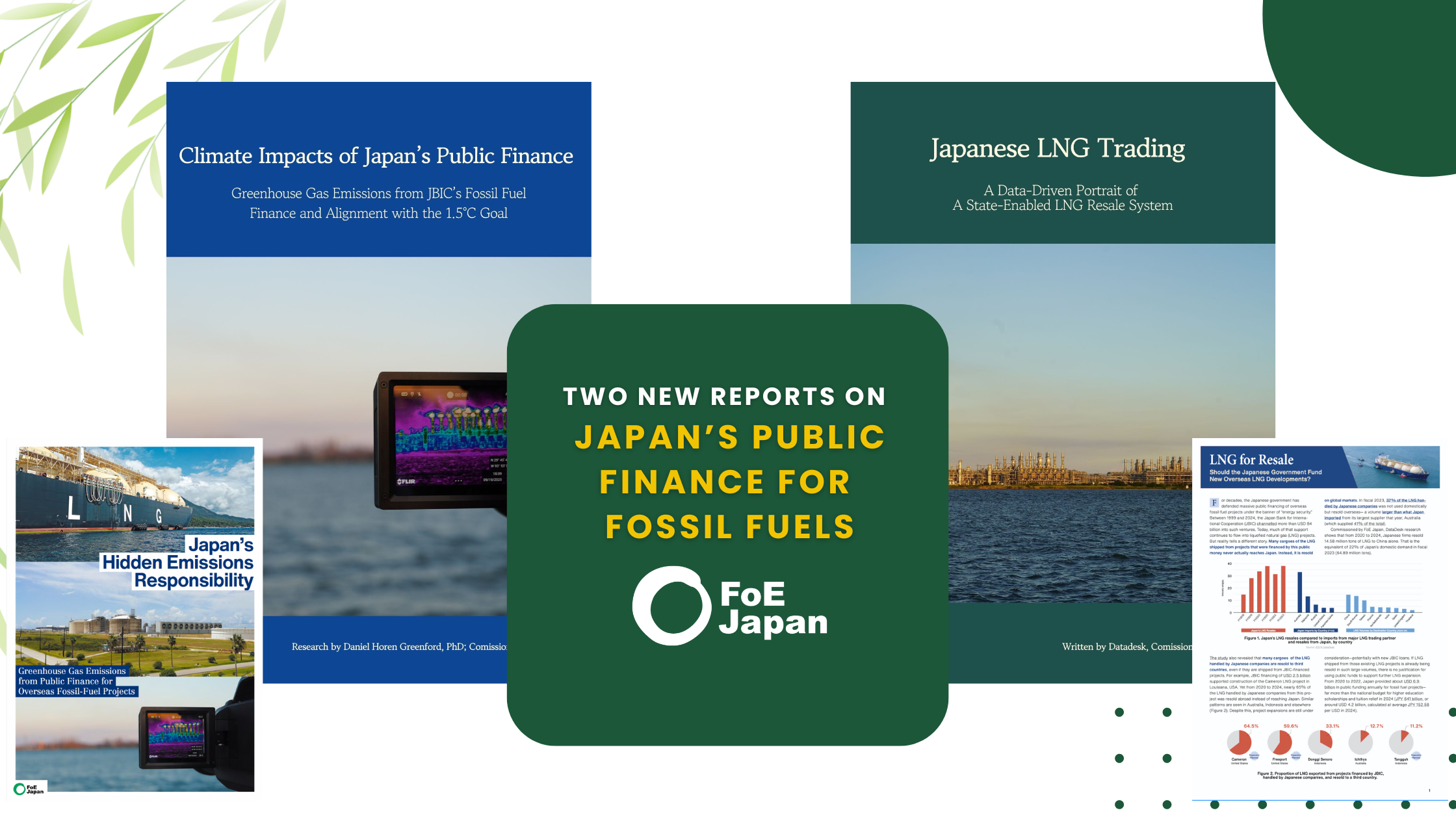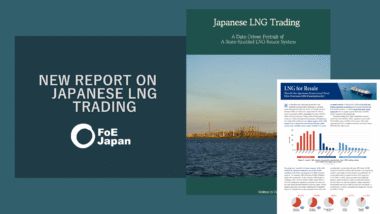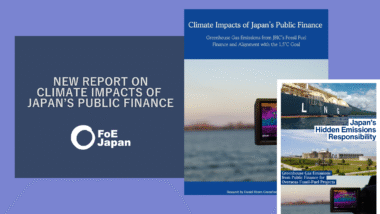New reports reveal Japan’s mammoth public financing does not contribute to domestic energy security; JBIC-funded emissions comparable to top-emitting countries

TOKYO – As climate action becomes ever more urgent, the Japanese government has still not ended its large-scale financial support for overseas fossil fuel projects. This stance has been repeatedly criticized at past COPs, earning Japan the “Fossil of the Day” award and sparking protests on site.
Meanwhile, its export credit agency, the Japan Bank for International Cooperation (JBIC), is linked to emissions on a scale comparable to some of the world’s top polluting countries, according to two new analyses released today by Friends of the Earth Japan.
The reports provide detailed evidence on how Japan’s public financing and corporate practices are shaping global fossil fuel flows and greenhouse gas (GHG) emissions.
The first study, a first-of-its-kind comprehensive accounting of emissions linked to JBIC’s fossil fuel financing from 1999 to 2024, estimates that fossil fuel projects backed by JBIC in 2024 generated about 408 million tons of CO2e, placing JBIC’s finance emissions above those of France, the United Kingdom, and Italy. When the cumulative emissions of all JBIC-financed fossil fuel projects are included, the total reaches 1.95 billion tons CO₂e—equivalent to the fifth highest national total globally.
The analysis also finds that JBIC’s projected 27% emissions reduction by 2030 falls short of the 43% cut recommended by the IPCC for alignment with the 1.5°C goal, suggesting that Japan’s public finance trajectory remains inconsistent with global climate targets.
The second study, which examined liquefied natural gas (LNG) resales patterns, challenges the notion that Japan’s overseas gas investments are essential for energy security.
Using shipment data from 2020 to 2024, the report found that nearly 64.5% of LNG handled by Japanese companies at the JBIC-financed Cameron LNG project in the United States was resold abroad rather than supplied to Japan. China was identified as the top resale destination, receiving 14.58 million tons of LNG—roughly 20% of Japan’s domestic gas demand in FY2023.
Friends of the Earth Japan called on the Government of Japan and JBIC to review their fossil fuel financing policies in light of these findings, emphasizing the need for public funds to align with both climate objectives and long-term energy stability.
Quotes
Hiroki Osada, Development Finance & Environment Campaigner, FoE Japan
“These findings show that Japan’s public finance is exporting pollution, risk, and dependency under the banner of energy security. Instead of reinforcing fossil fuel reliance overseas, the Japanese government and JBIC should redirect resources toward supporting genuine energy transition at home and abroad.”
Daniel Horen Greenford, PhD, SSHRC Postdoctoral Fellow, McGill University
“Our recent study shows JBIC’s existing investments don’t align with efforts needed to limit global heating to 1.5°C by the end of the century. The bank’s trend of continued investments in fossil fuel producing and consuming projects are at odds with even the finance industry’s own more generous and insufficient guardrails. They’ve shifted the goal posts and still can’t make their math work.”
Louis Goddard, Head of Research, Data Desk
“By pursuing this aggressive strategy even as demand for gas falls in Japan itself, executives and policy-makers risk enabling further unsustainable expansion of global gas production while locking neighbours in the Pacific region into long-term dependence on a volatile and unreliable source of energy.”
Publications released today
- Daniel Horen Greenford, PhD, Climate Impacts of Japan’s Public Finance: Greenhouse Gas Emissions from JBIC’s Fossil Fuel Finance and Alignment with the 1.5°C Goal
- Summary Briefing by FoE Japan: Japan’s Hidden Responsibility: Overseas GHG Emissions from Government-Backed Fossil Fuel Finance
- DataDesk, Japanese LNG Trading: A Data-Driven Portrait of A State-Enabled Resale System
- Summary Briefing by FoE Japan: LNG for Resale: Is Public Support for New Overseas LNG Projects Necessary?

